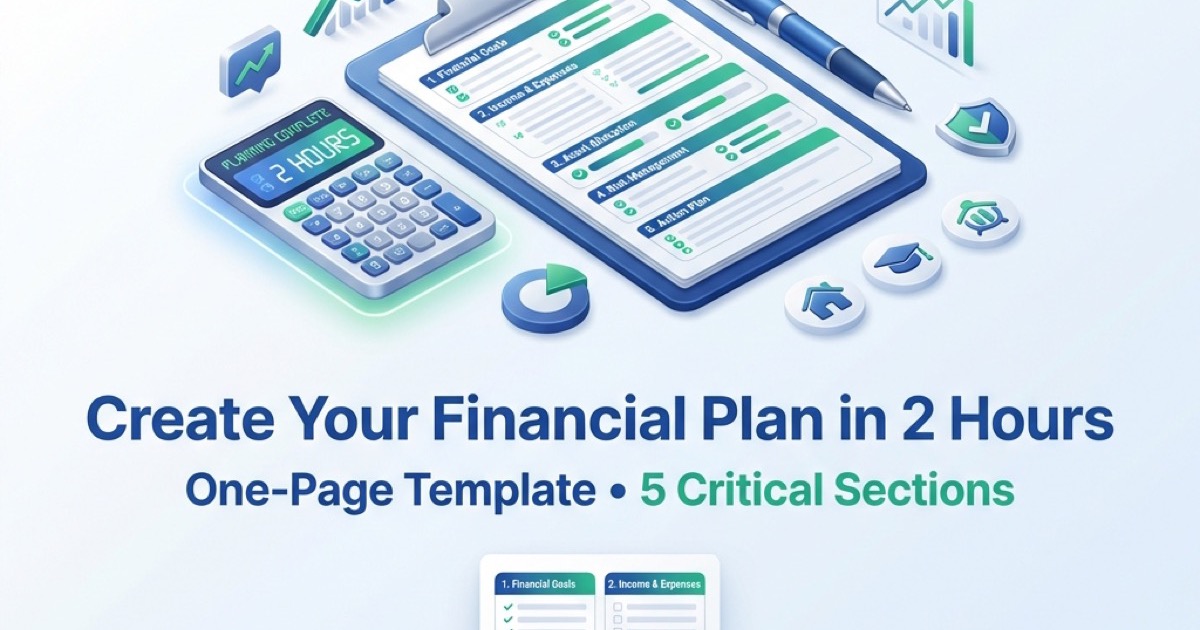· WeInvestSmart Team · financial-planning · 10 min read
When Does It Make Sense to Hire a Financial Advisor? (And How to Find a Good One)
Feeling lost with your finances? This guide clarifies when to seek professional advice, decodes the confusing world of advisors (fee-only vs. commission), and gives you the exact questions to ask to find a trustworthy expert.
Most people assume a financial advisor is a luxury reserved for the wealthy, like a personal chef or a private jet. They picture slick-talking salespeople in expensive suits managing vast family fortunes. So, they soldier on alone, navigating the treacherous waters of investing, retirement planning, and debt management with a patchwork of blog posts and advice from their brother-in-law. But here’s the uncomfortable truth: for many, going it alone is the most expensive decision they’ll ever make. The cost of inaction, missed opportunities, and emotionally-driven mistakes can dwarf the fees of a professional.
We’ve all heard the competing narratives. On one hand, the DIY investing revolution, powered by low-cost index funds and accessible online platforms, has made self-management more viable than ever. On the other, the financial world has grown infinitely more complex, with a dizzying array of products, tax laws, and market volatility that can paralyze even the most diligent saver. This leaves the average person in a state of confusion, wondering if they are capable of managing it all themselves or if they are leaving a fortune on the table by not seeking help.
But what if we told you the decision to hire an advisor isn’t about how much money you have? It’s about the complexity of your life and the value of your time. This isn’t about surrendering control; it’s about gaining a strategic partner. And this is just a very long way of saying that hiring a good financial advisor is like hiring a personal trainer for your finances—they provide the expertise, accountability, and strategic plan you need to reach peak financial fitness.
The DIY Dilemma: When Your Finances Outgrow Your Expertise
Before we explore how to find an advisor, we must first address the “why.” Why can’t you just manage your money yourself? For a while, you absolutely can. If you’re young, have a straightforward financial life, and are focused on basic goals like building an emergency fund or contributing to a 401(k), a simple, low-cost, automated strategy is often sufficient. But life has a way of getting complicated.
Going straight to the point, complexity is the enemy of the DIY investor. The system works well until it doesn’t. Major life events are the tripwires that often signal the need for professional guidance. Getting married means merging financial lives and goals. Having a child introduces the need for college savings and life insurance. Receiving an inheritance or selling a business creates complex tax implications. Nearing retirement transforms you from an accumulator of assets into a distributor, a fundamentally different and more dangerous game.
The funny thing is that many people who have the intellectual capacity to manage their money lack the emotional discipline. They understand the principle of “buy low, sell high,” but panic and sell during a market crash, locking in devastating losses. A good advisor’s greatest value is often not in picking winning stocks, but in acting as a behavioral coach who keeps you from making catastrophic, fear-driven decisions. You get the gist: you’re not just paying for financial expertise; you’re paying for a seasoned, objective partner to navigate complexity and chaos.
You may also be interested in: How to Calculate Your Financial Independence (FI) Number
The Advisor Abyss: Decoding the Different Types of Professionals
Alright, you’ve decided you might need help. Now you face the most confusing part of the journey: figuring out who to trust. The financial services industry is a jungle of different titles and compensation models, and choosing the wrong one can be disastrous. Here’s where things get interesting. The most important question you can ask an advisor has nothing to do with their investment performance.
The single most critical question is: “Are you a fiduciary?”
A fiduciary has a legal and ethical obligation to act in your best interest at all times. This is the highest standard of care. Many advisors, however, operate under a lower “suitability” standard. This means they only have to recommend products that are “suitable” for you, not necessarily what’s best. A suitable product might have higher fees or a higher commission for the advisor than a better, cheaper alternative.
This leads us to the crucial distinction in how advisors get paid:
Fee-Only Advisors: These professionals are paid directly and only by you. Their compensation can be an hourly rate ($200-$400), a flat fee for a specific project like a financial plan ($2,000-$7,500), or a percentage of the assets they manage (typically around 1% annually, often scaling down for larger portfolios). Because they do not earn commissions from selling products, the conflict of interest is minimized. This is the most transparent model.
Commission-Based Advisors: These advisors earn their income by selling you financial products, such as mutual funds, annuities, or insurance policies. While the upfront cost may seem lower, this model is rife with potential conflicts of interest. An advisor might be incentivized to recommend a product that pays them a higher commission, even if it’s not the absolute best option for you.
Fee-Based Advisors: This sounds like “fee-only,” but it’s a deceptive distinction. A fee-based advisor has a hybrid model where they charge you a fee and can also earn commissions from selling products. While not inherently bad, this structure reintroduces the conflicts of interest that the fee-only model eliminates.
This sounds like a trade-off, but it’s actually a bright line. To ensure your interests are always placed first, you should almost exclusively seek out a fee-only fiduciary advisor.
You may also be interested in: Planning for Life’s Big Moments: How to Financially Prepare for a Wedding, a Baby, and a New Home
The Vetting Process: How to Find and Interrogate a Potential Advisor
Now that you know what you’re looking for, how do you find one? Simply searching online will unleash a torrent of ads. Instead, use trusted, independent sources.
- Professional Organizations: The National Association of Personal Financial Advisors (NAPFA) and the CFP Board have searchable directories of members, all of whom are fiduciaries.
- Referrals: Ask friends, family, or colleagues who they trust and have had good experiences with.
Once you have a list of 2-3 candidates, it’s time to interview them. This is a job interview, and you are the employer. Do not be intimidated. A good advisor will welcome your questions. Here is your interrogation script:
- “Are you a fiduciary, and will you state that in writing?” The answer must be an unequivocal “yes.”
- “How do you get paid?” You are looking for a clear explanation of their fee-only structure.
- “What are your qualifications? What do the letters after your name mean?” Look for the Certified Financial Planner™ (CFP®) designation. This is the industry’s gold standard, requiring rigorous exams, experience, and a commitment to ethical standards, including a fiduciary duty.
- “What types of clients do you typically work with?” You want an advisor who understands people in your situation, whether you’re a small business owner, a doctor, or a young professional with stock options.
- “What is your investment philosophy?” Their answer should be clear, evidence-based, and aligned with your own views. A focus on low-cost, diversified, long-term investing is generally a good sign.
- “Have you ever been publicly disciplined for any unlawful or unethical actions?” You might feel awkward asking this, but you don’t have to. You can—and absolutely must—verify this yourself.
And this is just a very long way of saying you must do your own background check. Use FINRA’s BrokerCheck and the SEC’s Investment Adviser Public Disclosure (IAPD) websites. These free tools are your financial polygraph. You can enter an advisor’s name and see their entire employment history, their licenses, and any disclosures, which include customer complaints, regulatory actions, or criminal proceedings. An advisor with a clean record is a minimum requirement.
You may also be interested in: How to Set SMART Financial Goals You’ll Actually Achieve This Year
The Bottom Line: This Isn’t an Expense, It’s an Investment
Hiring a financial advisor isn’t a sign of weakness or an admission of failure. It’s a strategic decision to bring in an expert to help you optimize one of the most important areas of your life. The right advisor provides far more than just investment management. They provide a comprehensive strategy, tax efficiency, estate planning guidance, risk management, and perhaps most importantly, behavioral coaching to protect you from yourself.
The process of finding a great advisor requires diligence. You must understand the different types of advisors, insist on a fiduciary standard, and meticulously vet their credentials. But the payoff is immense: a sense of clarity, confidence, and control over your financial future. Remember, the goal isn’t just to accumulate money; it’s to use that money to build the life you want. A great advisor is the architect who helps you design and build that life. You get the gist: start your search, ask the tough questions, and give yourself the professional ally you deserve.
This article is for educational purposes only and should not be considered personalized financial advice. Always conduct your own due diligence before hiring a financial professional.
How to Hire a Financial Advisor FAQ
When should I consider hiring a financial advisor?
You should consider hiring a financial advisor during major life transitions or when your financial situation becomes complex. Key moments include getting married, having a child, receiving an inheritance, starting a business, or nearing retirement. An advisor is also valuable if you lack the time, expertise, or discipline to manage your finances effectively.
What is the difference between a fee-only and a commission-based financial advisor?
A fee-only advisor is paid directly by you through hourly rates, a flat fee, or a percentage of the assets they manage. They do not earn commissions for selling financial products. A commission-based advisor earns money from selling you specific products, like mutual funds or insurance, which can create a conflict of interest. A fee-based advisor is a hybrid, charging fees and also potentially earning commissions.
What is a fiduciary, and why is it important?
A fiduciary is a professional who is legally and ethically required to act in your best interest at all times. This is the highest standard of care in the financial industry. Working with an advisor who is a fiduciary ensures that their recommendations are based on your needs, not on how much they might earn from a particular product. Always ask a potential advisor, “Are you a fiduciary?”
What does CFP® mean, and should I look for it?
CFP® stands for Certified Financial Planner™. It is a prestigious professional certification that requires extensive education, a rigorous exam, several years of experience, and adherence to a strict code of ethics. A CFP® professional is required to act as a fiduciary for their clients. While not the only valuable credential, it is considered the gold standard in financial planning and is a strong indicator of competence and professionalism.
How can I check an advisor’s background and credentials?
You can and should verify any potential advisor’s background using free online tools. The best resources are FINRA’s BrokerCheck and the SEC’s Investment Adviser Public Disclosure (IAPD) website. These government-regulated sites show an advisor’s employment history, licenses, and, most importantly, any customer complaints or disciplinary actions.



